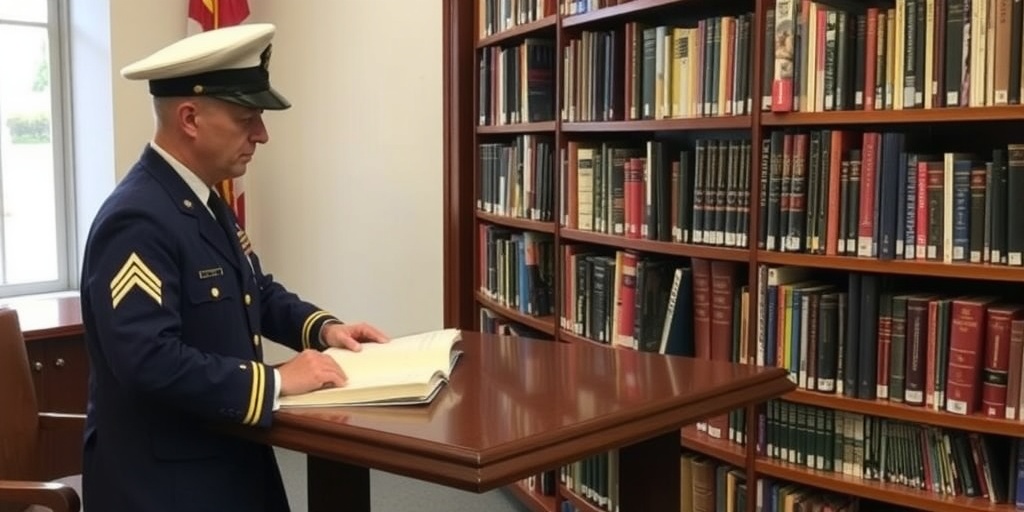Now Reading: 381 Books Removed from Naval Academy Library
-
01
381 Books Removed from Naval Academy Library
381 Books Removed from Naval Academy Library

Navy Removes 381 Books on Diversity and Inclusion from Nimitz Library
In a significant decision reflecting the ongoing cultural and political debates in the United States, the Navy has announced the removal of 381 books from the U.S. Naval Academy’s Nimitz Library, located on the campus in Annapolis, Maryland. This move, undertaken earlier this week, has garnered widespread attention and criticism from various quarters, as it underscores the impact of national directives regarding diversity, equity, and inclusion (DEI) topics.
The list of excluded books was made public on Friday evening, revealing a series of titles that primarily focus on issues related to race, gender, and social justice. Among these texts is the widely-discussed "How to Be Anti-Racist" by Ibram X. Kendi, which has been both lauded and criticized for its take on systemic racism and the importance of actively opposing it. Other notable titles that were removed include "The Making of Black Lives Matter" by Christopher J. Lebron, "How Racism Takes Place" by George Lipsitz, and "The Fire This Time," an anthology edited by Jesmyn Ward. The list highlights significant works examining the history and continued impacts of racism in America, including studies of the Ku Klux Klan and the historical context of lynching.
This action follows an executive order issued by former President Trump in January, which aims to curb the spread of materials related to DEI within K-12 education. This directive specifically targeted what the administration termed "radical indoctrination" in schools. Recently, however, Secretary of Defense Pete Hegseth’s office clarified that this ban would extend to higher education institutions, including military academies like the Naval Academy. A notification was sent to the academy on March 28, indicating the intention to enforce these restrictions even in a college setting.
The implications of this decision have sparked significant discussions regarding academic freedom and the role of educational institutions in discussing sensitive societal issues. Proponents of the book removals argue that these actions are necessary to maintain a focus on military training and values, while critics contend that such censorship undermines the educational mission of universities, particularly a service academy that should foster critical thinking among its future leaders.
In addition to the race-related texts, the list of removed books includes works that delve into gender and sexuality. Titles such as "Bodies in Doubt: An American History of Intersex" by Elizabeth Reis and "Between XX and XY: Intersexuality and the Myth of Two Sexes" by Gerald N. Callahan have also been taken off the shelves. These removals align with another executive order from Trump issued in January, which asserts the binary nature of sex, declaring that there are only two sexes. This stance has drawn condemnation from many in the LGBTQ+ community and advocates for gender rights, who view it as a denial of the complex realities surrounding gender identity.
The National Academy’s actions to remove these books came swiftly, with the academy reportedly beginning to pull titles from its library as early as Monday evening. The effort was largely completed by the time Secretary Hegseth visited the Annapolis campus on Tuesday afternoon to engage with midshipmen. The timing of these removals has raised questions about the influence of political ideologies on educational content and the autonomy of academic institutions.
As the debate over DEI topics continues to rage across the country, the Naval Academy’s recent actions may serve as a bellwether for other military and educational institutions facing similar pressures. The Navy’s decision potentially signals a broader trend towards the regulation of educational materials based on political ideology, stirring concerns among educators, students, and scholars about the future of academic inquiry and the free exchange of ideas.
In the wake of these developments, it remains to be seen how the Naval Academy, along with other educational institutions, will navigate the complexities of political influence, academic freedom, and the importance of inclusivity in their curricula. As discussions surrounding diversity, equity, and inclusion become increasingly polarized in the public sphere, the repercussions of these decisions are likely to resonate well beyond the walls of one library in Annapolis, shaping the landscape of higher education for years to come.
Stay Informed With the Latest & Most Important News
Previous Post
Next Post
-
 01New technology breakthrough has everyone talking right now
01New technology breakthrough has everyone talking right now -
 02Unbelievable life hack everyone needs to try today
02Unbelievable life hack everyone needs to try today -
 03Fascinating discovery found buried deep beneath the ocean
03Fascinating discovery found buried deep beneath the ocean -
 04Man invents genius device that solves everyday problems
04Man invents genius device that solves everyday problems -
 05Shocking discovery that changes what we know forever
05Shocking discovery that changes what we know forever -
 06Internet goes wild over celebrity’s unexpected fashion choice
06Internet goes wild over celebrity’s unexpected fashion choice -
 07Rare animal sighting stuns scientists and wildlife lovers
07Rare animal sighting stuns scientists and wildlife lovers




















